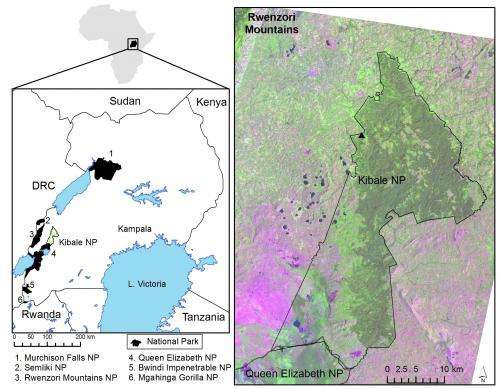Researchers find African farmers need better climate change data to improve farming practices

Researchers from the University of New Hampshire have found that many African farmers inaccurately perceive changes in climate and rainfall when compared with scientific data, highlighting the need for better climate information to assist them to improve farming practices.
"Quantifying local people's perceptions to climate change, and their assessments of which changes matter, is fundamental to addressing the dual challenge of land conservation and poverty alleviation in densely populated tropical regions," said Joel Hartter, assistant professor of geography at UNH and the principal investigator on the project.
The research is presented in the online journal PLoS ONE in the article "Patterns and Perceptions of Climate Change in a Biodiversity Conservation Hotspot." In addition to Hartter, the research team also includes Mary Stampone, assistant professor of geography at UNH and New Hampshire state climatologist; Sadie Ryan of the State University of New York's College of Environmental Science and Forestry, and the National Center for Ecological Analysis and Synthesis, University of California Santa Barbara; Karen Kirner of the University of Florida; Colin Chapman of McGill University and the Wildlife Conservation Society, Bronx, New York; and Abraham Goldman of the University of Florida.
The researchers investigated farming practices and perceptions of climate change in the Albertine Rift region in East Africa, one of the world's most threatened biodiversity hotspots due to dense agriculture, high levels of land and resource pressures, and habitat loss and conversion. This leads to high potential for conservation conflict. They relied on three separate household surveys conducted in the vicinity of Kibale National Park, a small forest park along the equator in Uganda known for its large population of endangered chimpanzees.
The researchers found that farmers are concerned with variable precipitation. Many survey respondents reported that conditions are drier and rainfall timing is becoming less predictable.
"Perceptions of local farmers are important because farmers often manage land according to their perceptions and beliefs. In these communities, meteorological information from the scientific community is rarely available, and farmers rely on their own observations and subjective interpretations," Hartter said.
However, an analysis of daily rainfall data for the period 1981 to 2010 indicated that total rainfall both within and across seasons has not changed significantly, although the timing and transitions of seasons has been highly variable. Results of rainfall data analysis also indicated significant changes in the intra-seasonal rainfall distribution, including longer dry periods within rainy seasons, which may contribute to the perceived decrease in rainfall and can compromise food security.
Local variation in rainfall is not captured by large-scale measurements used in climate research. However, it is the local information that is used to make planting and harvesting decisions, and therefore has the highest impact on food security.
"Our results highlight the need for fine-scale climate information to assist agro-ecological communities in developing effective adaptive management," Hartter said. "If we can provide farmers with more relevant and physically accurate information, it could lead to more sustainable land use management practices."
Provided by University of New Hampshire



















